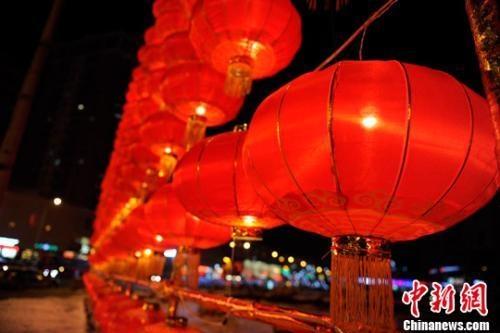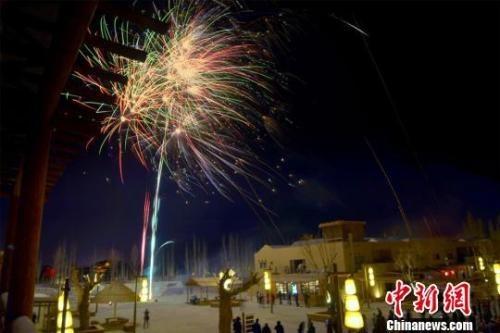Source: China News Network
Now when it comes to New Year’s Day, it is easy for people to think of January 1 of the Gregorian calendar every year, and use this rare holiday to visit relatives and friends or reunite with their families.
In fact, in ancient China, there was also "New Year’s Day". Only the time is inconsistent, and the connotation and customs are much richer. What is the difference between the two?

Data map: Red lanterns. Song Wenjia
Where was the source of the ancient New Year’s Day?
Literally, "yuan" means "head" and "Dan" means "day". When the two words are combined, they can be extended to "the first day of the new year". Therefore, "New Year’s Day" is also called "three yuan", that is, the yuan of the year, the yuan of the month and the yuan of the time. It is often called "the first day of the first month" now.
It is said that the ancient New Year’s Day originated in Zhuan Xu, one of the three emperors and five emperors, with a history of more than 5,000 years.
In the Tang Dynasty, Fang Xuanling and others were responsible for compiling the Book of Jin, in which there was a record about New Year’s Day: "Zhui Di took the first month of Meng Xia as the yuan, but it was actually the spring of New Year’s Day."
The early record of New Year’s Day can also be found in the poem Jieya by Xiao Ziyun, a literary historian in the Southern Dynasties. It mentioned "Four Seasons New Year’s Day, Long Life and Early Spring Dynasty", which clearly explained its "beginning" significance.
In the Song Dynasty, Wu Zimu’s "Dream Liang Lu" also said, "The first month of the new year is called New Year’s Day, and the custom is called New Year’s Day. One-year-old festival preface, this is the first record.
There is another legend about its origin. According to legend, in the ancient Yao and Shun period, Emperor Yao was diligent and loved the people. When he was old, he gave up his position to Shun, who had both ability and political integrity, and Shun gave up his position to Yu, who had made great contributions to water control. They all did a lot of good deeds and were very loved by the people.

Data map: Dunhuang Crescent Spring Town held a desert bonfire party to celebrate New Year’s Day. Photo by Wang Binyin
In order to commemorate them, people regard the day when Shun offered sacrifices to heaven and earth and Yao after Yao’s death as the beginning of the year, which is called "New Year’s Day" or "Yuanzheng" and becomes the origin of ancient New Year’s Day.
As the calendar changes, so does the time of New Year’s Day.
Legends are interesting, but the origin of New Year’s Day is closely related to human life. For example, doing farm work requires some accurate time nodes. And the beginning of a year is of special significance, so human beings invented the calendar.
The ancients discovered the natural phenomena of alternation of day and night, lack of full moon and four seasons. Finally, the cycle of alternation of day and night was regarded as a "day", and the "month" was determined with reference to the cycle of moon phase change. The grain ripening cycle represented the cold and summer, which was called "year", that is, the time when the sun circled the earth once.
It took a long time to calculate the above cycle accurately, and the calendar changed several times, so did the time of "New Year’s Day". The Xia dynasty used the summer calendar, with Meng Xiyue (January) as the first month; The lunar calendar of Shang Dynasty took the twelfth month (December) as the first month; In the Zhou Dynasty, the first month was the winter month (November).
It was not until the period of Emperor Wu of the Han Dynasty that it was no longer tossed around. At that time, it was stipulated that Meng Xiyue (January) was the first month, and the first day of Meng Xiyue (the first day of the first month in the summer calendar) was called New Year’s Day. Since then, it has been followed until the end of the Qing Dynasty.
Data Map: New Year Temple Fair during the New Year’s Day holiday. Photo by Liu Changyong
Chen Lianshan, a folklore expert, said that in the early years of the Republic of China, the government at that time revised the calendar and wanted to use the entire Gregorian calendar as a time system, so the Gregorian calendar was named "New Year’s Day" on January 1, and the traditional New Year’s Day was renamed "Spring Festival".
What a word "eat"
In ancient times, it was an agricultural society. By New Year’s Day, large-scale farming activities had already ended, and there were few recreational activities. Therefore, everyone quickly figured out all kinds of ideas related to eating, and they were full of tricks.
In the Southern and Northern Dynasties, Liang Zonggu wrote a book called A Record of the Age of Jingchu, which recorded various festival customs in ancient Chu. When it comes to New Year’s Day, it is explicitly mentioned that you should worship him, drink pepper and cypress wine, drink peach soup … and eat an egg each.
Among them, there are drinks, food and medicine, which are almost related to all aspects of life, and each has its own special meaning, expressing the wish of happiness, prosperity and well-being in the coming year.
What is more interesting is that some places want to eat "soup cakes". The "cake" here generally does not refer to baked wheat cake. "Miscellaneous Notes on Years Old" in the Northern Song Dynasty said: "On New Year’s Day, people in the capital eat more cakes, so-called year’s eve, or something like that." Suobing refers to a cake as slender as a rope, which looks like modern noodles.
Data map: The masters are putting the sweet-scented osmanthus sugar rice cakes in order. Wang Sizhe
During the Ming and Qing Dynasties, people liked to eat rice cakes on New Year’s Day, especially in the south. At the end of the Ming Dynasty, "A Brief Introduction to the Scenery of the Imperial Capital" mentioned that on New Year’s Day of the first month, it was quite interesting to "enjoy washing and stirring, eating jujube cakes and eating rice cakes every day".
In different regions, rice cakes have also changed their names. Ming Zhengde’s "Qiongtaizhi" in Guangdong Province records that local people eat spring cakes: "Before New Year’s Day, spring cakes are steamed in glutinous rice flour (jí) sucrose or ash juice cages … all kinds of fruits are sacrificed in the new year, and they are cut into annual tea for mutual feedback." Shaped like today’s birthday cake.
"Gregorian Year" as a child
At present, the New Year’s Day in people’s mouth has become January 1 of the Gregorian calendar, and all kinds of old eating customs have disappeared. Gao Wei, a folklore expert, said that this is the "solar year" among the older generation. When I was a child, New Year’s Day was like Sunday, so I could take an extra day off.
But children still have children’s ways. Gao Wei is a Beijinger. When he was a child, every family was crowded in a big yard. On New Year’s Day holiday, he visited the yard, pulling children to jump houses and push iron rings … It was a great joy.
Data map: The taste of the year is rich. Cangyan photo
Catch up with the cold weather, they poured a few pots of cold water on the ground early, and soon it froze. A group of people sit on a small ice car to "skate"; Sometimes I take off the door of the second door and play table tennis, so that I forget to eat.
"I followed my father on duty on New Year’s Day, and I always heard them say that after today is next year." In Gao Wei’s impression, one year on New Year’s Day, when I was reading a book at night, I heard bells ringing on the radio to tell people that the new year was coming.
He said that in fact, the "solar year" is also the beginning of the new year, which also has the significance of saying goodbye to the old and welcoming the new. At this point in time, people can take a look at the past year and see what they have done, whether there are regrets or mistakes.
"On New Year’s Day, there should still be some sense of ceremony." Gao Wei said that you can also write down your expectations, encourage yourself to work hard in the coming year, and embrace new hopes and dreams. (Reporter Shangguan Yun)
Reporting/feedback